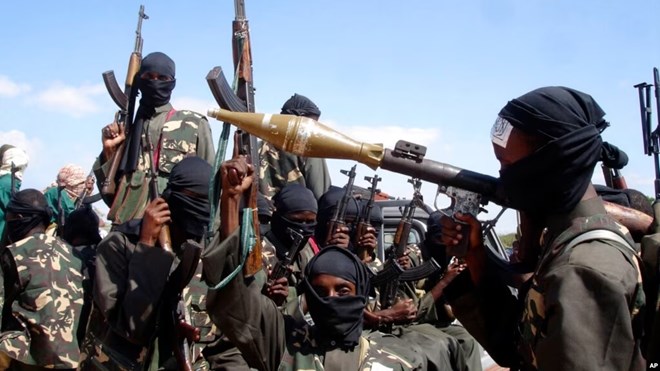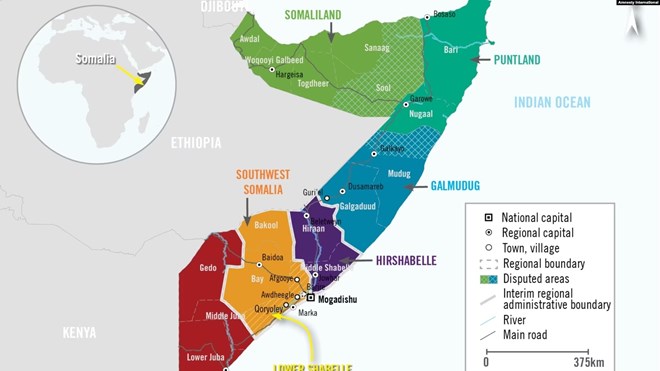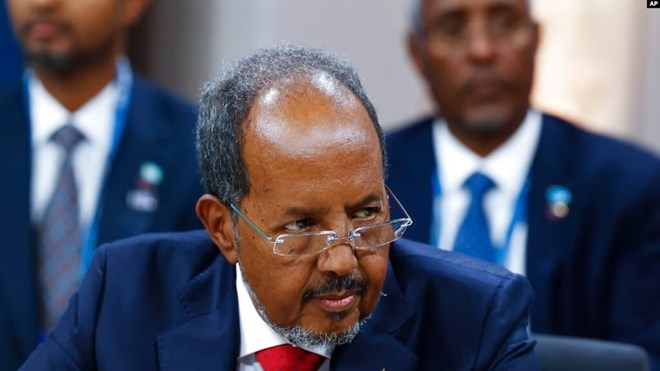
Sunday January 29, 2023
By Mohamed Olad Hassan
 FILE - Armed al-Shabab fighters ride on pickup trucks as they prepare to travel into the city, just outside the capital Mogadishu, in Somalia on Dec. 8, 2008.
FILE - Armed al-Shabab fighters ride on pickup trucks as they prepare to travel into the city, just outside the capital Mogadishu, in Somalia on Dec. 8, 2008.
MINNEAPOLIS — In Somalia, al-Qaida-affiliated militant group al-Shabab has been on a gradual retreat for months, and this could be the beginning of their end, experts told VOA.
In a televised speech in August 2022, Somali President Hassan Sheikh Mohamud announced a "total war" against the group, days after it staged a deadly hotel siege in Mogadishu, killing at least 21 people and wounding more than 100 others.
The president’s announcement came as local clans in central Somalia were revolting against the presence and the oppression of al-Shabab in their territories.
Since July, Somali government military operations in parts of the country have gained significant ground from the militants.
Al-Shabab ceded territories and major towns in the central Somali regions of Hiran, Middle Shabelle, Galmudug and South-West State. Government officials say they have killed more than 2,000 al-Shabab fighters, a number VOA could not independently verify.
As the government campaign enters its eighth month in February, the Somali government is preparing to open new battlefronts in southern parts of the country Somalia’s defense minister said Friday.
A week ago, government forces in Jubaland State took a step forward by capturing Janay Abdalle, a strategic village, from al-Shabab. Jubaland borders Kenya and is one of five Federal-member states in Somalia.
Speaking to VOA’s Somali service, Ismail Dahir Osman, former deputy commander of Somalia’s National Intelligence and Security Agency, said al-Shabab has been on the retreat since the government started supporting local clan militias fighting with them.
“Since the government offensive began with the support of local citizens, who are fed up with the group’s oppressions, al-Shabab has been losing territories and former strongholds in central regions. Thanks to Somali government military operations backed by local clan militias and foreign partners, including the United States,” he said.
Colonel Abdullahi Ali Maow, a former Somali intelligence official told VOA that he agrees the militants are on a downward spiral.
“It is obvious that al-Shabab has been losing ground and were squeezed out of major towns and villages they have been controlling for more than 10 years, including Harardhere, a coastal town and former pirate hub captured by Somali government forces on January 16,” he said. “I think it is the beginning of their end.”
Even if the group’s retreat continues, it is not the first time the status of a jihadi group in Somalia was damaged by multiple defeats.

Overview map of Somalia
It happened in 2006 when troops from what was then Somalia's Transitional Federal Government backed by Ethiopian troops defeated the Islamic Courts Union that had ruled Mogadishu and large swaths of south and central Somalia for months.
Disorder within the ranks helped the more radical terrorist elements within the ICU emerge. That became al-Shabab. The militant group grew and took control of large territories.
 FILE - Somalia's President Hassan Sheikh Mohamud looks on during the US-Africa Leaders Summit 2022, Dec. 13, 2022 in Washington.
FILE - Somalia's President Hassan Sheikh Mohamud looks on during the US-Africa Leaders Summit 2022, Dec. 13, 2022 in Washington.
So, if they’re defeated again, what’s to keep them from returning?
Hassan Sheikh Ali Nur, a professor at the Somali National University in Mogadishu, said this time is different.
“The ICU time, there was not a strong and internationally recognized government in Somalia, there was not the international military support, including the United States airstrikes, and more importantly the Somali citizens and nationalists were not fully supporting the government as they considered Ethiopian troops involvement as a foreign invasion,” Nur said.
Omar Yusuf Abdulle, a Horn of Africa affairs analyst, believes that the dream of al-Shabab — taking control of Somalia, overthrowing the western-backed government and imposing a strict version of Sharia law — is over. He cautions that the militant group will remain a security threat for many years to come because the group’s ideology alone is enough to inspire attacks.
“Despite the recent military defeat, the group can still do damage because their leaders are still out there, and they still control large territory in southern Somalia. Also, the die-hard followers of the group are still listening to them and there are probably thousands of them; therefore, the complete defeat of al-Shabab depends on the eradication of the ideology that inspires the terrorist,” Abdulle said.
The Somalia government also acknowledges that the dangerous ideology is very much alive and expects to see more terrorist attacks planned and commissioned by the group.
In its war against the group’s ideology, as a part of the government’s triple offensive against al-Shabab — which includes military and financial operations in addition to countering extremist propaganda — the government convened a four-day conference this week of Muslim scholars in Mogadishu that ended Thursday with the formation of a Supreme Council.
More than 300 Muslim clerics who attended the meeting declared their support for the government's war against the Islamist militant group, which has been fighting the government since 2007. The clerics vehemently denounced al-Shabab’s misinterpretation of Islam.
It was the first time in years that Somali clerics from all sects of Islam came together to denounce terrorism. Even the conservative Wahhabi sect, which has been accused of sympathizing with al-Shabab, participated.
Somali Prime Minister Hamza Barre said in his closing speech at the conference that the coming together of Somali clerics from different ideological persuasions could be the end of al-Shabab’s religious influence in Somalia.
“This will be instrumental in winning the war against al-Shabab and other extremist elements because it is the first time we have seen different sects of clerics sitting together and issuing a statement together against a common enemy. I am happy that you have joined the fight,” he said.
Last year, Barre named the former deputy leader of al-Shabab, Mukhtar Robow, as religious affairs minister. His selection was seen as an attempt to deflate al-Shabab's ideology.